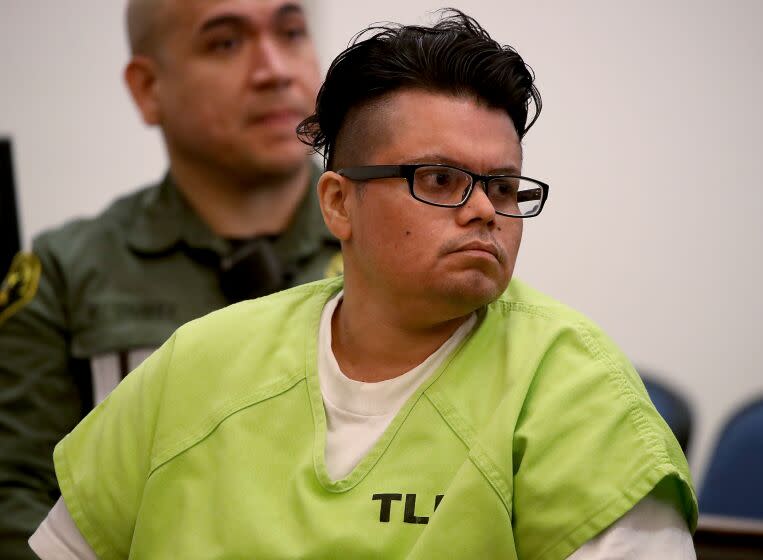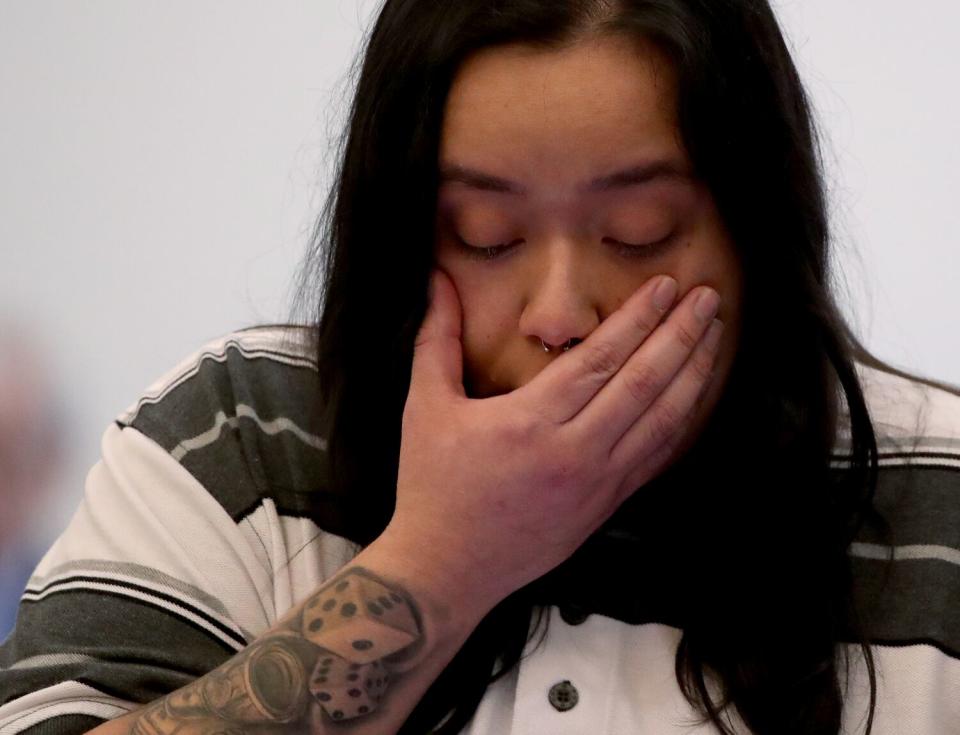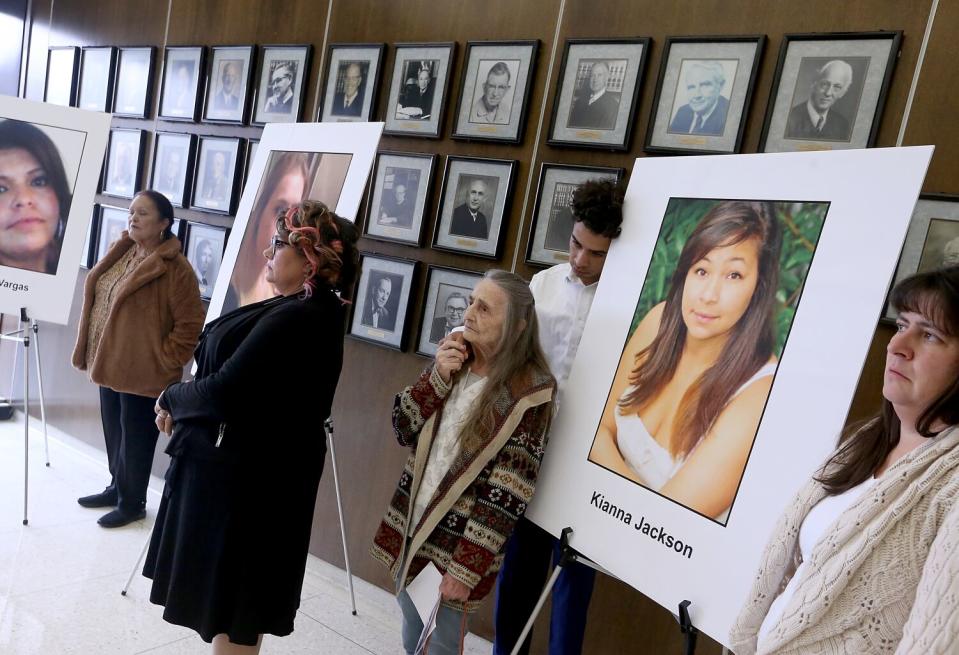Orange County serial killer Franc Cano gets life in prison after guilty pleas

Franc Cano, a serial killer who abducted and murdered several women with an accomplice in Anaheim and Santa Ana while on parole for a sex offense, pleaded guilty to murder Thursday after prosecutors dropped their call for the death penalty.
Cano’s guilty pleas to four counts of rape and murder — which brings an automatic prison sentence of life without parole — eliminates the need for his long-delayed trial. It appears to close a case that had languished while victims’ families begged for action.
“He took away everything from us,” Melody Anaya, the daughter of victim Martha Anaya, told the judge as Cano sat a few feet away in court Thursday. “I wasn’t there when he killed her, but I see it in my head every day.”
Anaya was 12 when her mother vanished from a street in Santa Ana in late 2013. She said she still sends her mother messages, even though they go unread. “I wish the pain would stop," Melody Anaya said. "… It keeps me awake at night and eats me alive every day.”
It has been nearly a decade since Cano, now 36, embarked on a five-month series of murders with his companion, Steven Gordon. Both men were homeless sex offenders with ankle monitors, living in vehicles in an industrial area of Anaheim. Their targets were women working in street prostitution in Orange County.

Their first victim, as far as police know, was Kianna Jackson, a Las Vegas woman who had just turned 20 when she disappeared from the streets of Santa Ana on Oct. 6, 2013. Her mother, Kathy Menzies, recalls that when she reported her missing, police showed little interest in searching for her, with the explanation that Jackson was a “circuit girl” with a record for prostitution.
Her body was never found. Nor was the body of a second woman, Josephine Monique Vargas, 34, who vanished 18 days later, or that of Anaya, 27, who disappeared 19 days after Vargas.
On March 14, 2014, detectives were summoned to Republic Waste Services in Anaheim, where another young woman’s body had been found amid debris. She was identified as Jarrae Estepp, 21, of Ardmore, Okla., who had been staying at the Anaheim Lodge on Beach Boulevard.
Detectives linked the crimes to Cano using a GPS monitor the courts had ordered him to wear. Cano was on state parole for molesting a relative and federal probation for having cut off his ankle monitor and fleeing across state lines. (The lead investigator in the case, Anaheim police Det. Julissa Trapp, was the subject of a 2019 Times series and podcast examining her role in the case.)
Cano’s DNA was also found in Estepp’s body, and his cellphone texts showed that he and Gordon had exchanged thinly veiled references to abducting and murdering women. On the night Estepp disappeared, Cano wrote to Gordon: “You’re gonna get your hands dirty. … Get rid of her.”
After raping and killing the women, often by strangulation, the men would dump the bodies in a trash bin behind the auto-body shop where Gordon worked.
Family members of the victims spoke of their grief and anger at Thursday’s hearing, while Cano sat in green scrubs by his attorney a few feet away. Some family members said they forgave him; some said they couldn’t.
They spoke of their relief that the legal case seemed to be at an end. But Dianne Menzies, Kianna Jackson's grandmother, told the judge there was no such thing as closure.
“What is closure? I wish someone would explain that to me,” Menzies said. “We had no body to bring home and give a decent burial. … It leaves a hole in our hearts and a space in our family that will always be empty.”
Priscilla Vargas said her daughter, victim Josephine Monique Vargas, was her first child. “I will never, ever forgive you till I die,” she told Cano. “Her daughter still asks me, ‘Where’s my mommy?’”

When it came time to address the court, Cano spoke briefly, describing himself as “deeply and remorsefully sorry.”
“These four women were precious and dearly loved,” the murderer said, adding: “Please let love heal our hurting and wounded hearts.”
Gordon, Cano’s accomplice, went on trial in 2016 and insisted on representing himself. Gordon confessed to a role in the murders but attempted to blame authorities. His reasoning: Parole and probation agents should have been watching more vigilantly while he and Cano roamed the streets with ankle monitors, looking for victims.
At trial, Gordon ranted angrily and described Cano as a predator with no conscience, referring to him alternately as “my friend” and “that little bastard.”
Gordon asked for the death penalty, a jury agreed, and Orange County Superior Court Judge Patrick H. Donahue sent him to death row in San Quentin in February 2017.
Cano was expected to face trial soon after. But delays multiplied as attorneys left the case and the COVID-19 pandemic sharply curtailed court business. The case was also complicated by the former Orange County district attorney’s decision to seek the death penalty against Cano.
Cano’s attorney, Chuck Hasse, said he made a presentation to the DA’s office in October asking officials to reconsider. There was a new DA, Todd Spitzer, who seemed willing to listen to the argument that Cano was the less culpable member of the killing team.
Between the two killers, Hasse argued that his client had been the subservient member. “From birth, he was a follower,” Hasse said, while Gordon was the “alpha dog” and a “master of manipulation” with a “Svengali-like effect on the other."
Hasse said Cano, who is just over 5 feet tall, grew up as a “sickly” child, beset by asthma and eczema, in a dangerous part of Compton. “He came from a humble, working-class Latino family in a gang-infested neighborhood,” Hasse said. “He was his mother’s helper, an indoor child.”
After serving time for molesting a niece and moving to Orange County, Cano met Gordon while they were charging their ankle monitors outside a probation office.
The defense attorney said Gordon — who was 17 years older and physically larger, with a longer criminal record — posed as Cano’s guardian on the street, saying: “I’m the only one in your life. I’m the only one who protects you, who sticks with you through thick and thin.”
Eventually Gordon and Cano became lovers. Twice, they cut off their ankle monitors and fled the state together, only to be caught and briefly jailed before they returned to Anaheim.
“Imagine if your first boyfriend is Steven Gordon — there’s no template for that,” Hasse said. “This is his first relationship, period.”
Earlier this month, the DA informed Cano’s legal team that it would no longer seek the death penalty. The news that Cano would plead guilty followed quickly.
Jodi Pier-Estepp, mother of victim Jarrae Estepp, said she favored the death penalty for Cano but came around to the idea that life without parole would be a better way to resolve the case. It seemed increasingly unlikely that Cano would ever be executed, even if a jury decided he deserved it.
California has not executed a prisoner since 2006, and Gov. Gavin Newsom has ordered that San Quentin’s death row be dismantled and all condemned prisoners sent to other facilities.
“They ain’t executing nobody,” Pier-Estepp said.
Pier-Estepp said she spoke to Spitzer by phone just before Thanksgiving and expressed her frustration at the delay in resolving the case. “I kind of threw a fit,” Pier-Estepp said. “I told him I would picket in front of his office and home if he didn’t make a decision.”
Kathy Menzies, Jackson's mother, said she had anticipated Cano’s trial for years with a sense of dread. She worried about having to endure the graphic details of another trial. She said Cano’s plea was a relief.
“It’s like this heavy weight is gone,” she said.
After Cano entered the plea Thursday, Donahue sentenced him to life without parole, 3,171 days after his arrest.
At a news conference afterward, Spitzer said the victims’ mothers unanimously supported his decision to drop the death penalty. He stood before poster boards with the faces of the four women Cano was convicted of killing.
Missing was the face of Sable Pickett, a 19-year-old from Compton who vanished in February 2014. When he confessed to killing Jackson, Anaya, Vargas and Estepp, Gordon also said that he and Cano had abducted and killed an unknown fifth woman, who came to be known as Jane Doe No. 5.
Police eventually identified her as Pickett. Her body was never found. Gordon and Cano were not charged with her murder; both got a grant of immunity in exchange for information about her fate. Like the other missing women, detectives say they believe she is probably buried in a landfill in Brea.
This story originally appeared in Los Angeles Times.

